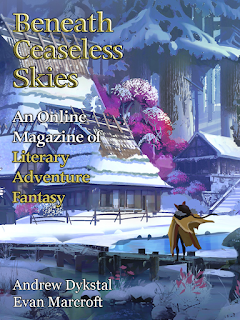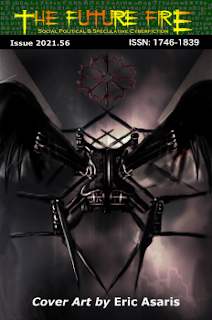I said I'd be back for a second part of my short-fiction-of-2021-marathon wrap-up, and I'm here to make good on that promise! Let's talk about some more of my favourite short stories read in January, covering a whole bunch of magazine issues from last year. (Part 1 is here, if you missed it!)
Unfettered Hexes: Queer Tales of Insatiable Darkness ed. dave ring
In just a couple of short years, Neon Hemlock have become one of my favourite publishers with their range of queer speculative fiction from diverse, boundary-pushing perspectives, and this collection is an excellent place to start if you haven't picked up one of their books before. Both the theme and the aesthetic are excellent: each story comes illustrated with a full page image from Matthew Spencer, and the stories involve a range of witchy and occult premises covering everything from space station cults and oxygen maintenance (Effects of Altitude on the Blood Elevations of Love by Marianne Kirby) to sapphic triads exacting supernatural revenge on their landlord (Love and Light by H.A. Clark). There's also two comics, some poetry and two narrative adventure games: Exterior, by Mercedes Acosta, about leaving the safety of your home into the unknowable dangers of the outside; and Hold the Dark, by Allie Bustion, about you and your coven preparing for a mysterious oncoming darkness. There's even some classifieds by Jordan Shiveley, of Dread Singles fame! It adds up to a really cool package where every piece of work contributes to an engaging whole.
But let's talk about some of my favourite short stories! Kel Coleman (and, look, I could go off on another whole tangent about how many great stories Kel Coleman put out in 2021, but you should just go check them out and not take my word for it) knocks it out of the park with "Before, After, and the Space Between", a story about an innately talented witch and her daughter, growing up as outsiders in a society where magic has been co-opted by a dominant culture that requires artefacts imbued with spirits of the dead to conduct it. Sanguine's mother narrates the growing rift with her daughter as she grows up, the circumstances of her death, and their eventual attempts at reconciliation from beyond the grave. The way the story navigates prejudice and cultural domination, wrapped up in a story between mother and daughter who have to overcome enormous barriers to come to an understanding, makes it heartbreaking and powerful and very much worth reading. I also really liked "Sutekh: A Breath of Spring" by Sharang Biswas, which creates a world based on a fictional game with strong parallels to Hades, where Osiris tries to fight his brother Set, constantly being resurrected in a pool of blood in Isis's cave when he fails. Except one day he wakes up and it's Amun-Au, not Isis, who greets him, and the two strike up a flirtatious rapport that becomes a high point of Osiris' frequent deaths, and blossoms into romance. As the scope widens to show us that this is a mod, one which becomes unstable with a subsequent game patch and stops the player from being able to progress in that version of the game, the story raises some really interesting questions about how fan engagement builds queer content into works that don't canonically care about them, blurring the line between that meta-commentary and the feelings of the characters themselves. If anything, the strong parallels to Hades and its real life studio Supergiant were drawbacks for me (Hades itself has two significant and inescapably canonical m/m romances, no modding required) but it doesn't take much to look beyond that mismatch to the general point that Biswas's story makes, and it's a good one.
There are also several great stories which build around specific places, be those the magical houses of "The Passing of Sinclair Manor, or, The House of Magical Negroes" by Danny Lore and "FOR CLOSURE" by Tania Chen, the supernatural contemporary city of "Dizzy in the Weeds" by L.D. Lewis and the future capitalist dystopia of "Undercity Spellwork", or the otherwordly juxtaposition of a trendy underground-carpark-turned-hotel (except don't call it a hotel, it's a Transitory Dwelling Experience) with the group of Black men dressed in intricate animal masks who come for a late night check-in, in "Antelope Brother" by Craig L. Gidney. That last story is narrated to perfection by bored hospitality worker Malik, who spends his mostly-dead shift reading and talking to his friend Kiki before investigating a supposed disturbance that turns into something more involved than he expected, and the slow ramping up of supernatural elements makes for a really funny, engaging story. Honestly, though, there's just not a bad story in here, and Unfettered Hexes covers a really impressive amount of ground while keeping its theme at the heart of every story. Well worth investing the time in.
Beneath Ceaseless Skies
With that in mind, it's not a surprise that the two standout stories from my recent readings are epics of an unusual type. "Quintessence", by Andrew Dykstal, is about a group of miners wintering at the top of an impossibly high mountain, kept alive by supplements and unable to venture outside due to the cold and lack . When Loren's compatriots start dying of what should be a preventable illness, and the mine's witch refuses to release the cure that would help them, he ends up murdering her and being possessed by her soul (the relationship that develops out of this is not as grim as it possibly should be, with that setup, but go with it). Between them, Loren and Rose begin to unravel the mystery behind their circumstances and the deaths, and hatch a desperate plan to escape their situation. There's a bucketload of tension and danger, and Rose is a fantastic character who gets plenty of time to shine despite not getting what she deserves within the story itself. And "A Manslaughter of Crows" by Chris Willrich is a story I want to press into everyone's hands, because it's about electoral fraud and gerrymandering in a fantasy city built on the principles of pirate democracy (otherwise known as the "swabocracy"), and the protagonist is a sentient cat who is part of a special investigations unit. Shadowdrop and his group of friends and allies (including a seagull called Purloiner-of-Chips, Hope the very good dog, and assorted humans) need to rush to unravel the plot threatening the city's election, and its connection to the newly formed bird party, before the tenets of their democracy are overthrown altogether. It's an adventure from start to finish, and I will never not be here for fantasy electoral politics.
Adventures Elsewhere
Finally, I have to throw in a word for an unconventional Twitter story: Unknown Number, by Azure Husky, is a Twitter thread of text message screenshots portraying a conversation where Gaby, a 46-year-old trans woman, is randomly contacted by an unknown number who turns out to be much closer to her than she realises. It's a powerful story of the decisions around transition, and how the smallest things can make that decision either possible and validating, or difficult to the point of impossibility. I think it's worth reading for how kind the two characters are to each other, and particularly the affirmations that Gaby gives her caller as we realise how unworthy of love and validation they feel about themselves. It's a delight, is what I'm saying, and you should read it. That's all.
POSTED BY: Adri, Nerds of a Feather co-editor, is a semi-aquatic migratory mammal most often found in the UK. She has many opinions about SFF books, and is also partial to gaming, baking, interacting with dogs, and Asian-style karaoke. Find her on Twitter at @adrijjy



